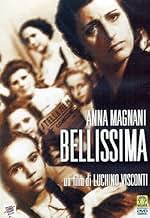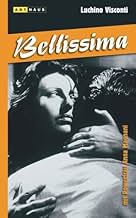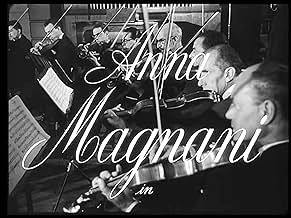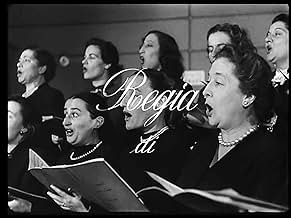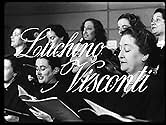IMDb-BEWERTUNG
7,7/10
5875
IHRE BEWERTUNG
Eine Frau aus der Unterschicht, die verzweifelt versucht, ihre Tochter zum Film zu bringen.Eine Frau aus der Unterschicht, die verzweifelt versucht, ihre Tochter zum Film zu bringen.Eine Frau aus der Unterschicht, die verzweifelt versucht, ihre Tochter zum Film zu bringen.
- Auszeichnungen
- 1 Gewinn & 1 Nominierung insgesamt
Liliana Mancini
- Iris
- (as Iris)
Vittorio Musy Glori
- Self
- (as Vittorio Glori)
Empfohlene Bewertungen
This is a very small story--a poor woman tries to make her daughter a child movie star--but it has a tremendous, operatic performance from Anna Magnani. Magnani is like all other stage mothers in that the success she desires for the child is really her frustrated ambition for herself (her tiny daughter has no interest in acting, and whines and cries all through the picture), but unlike them in that she never loses her sense of humour. When she realises she has been cheated, instead of becoming outraged, she laughs at her own foolishness, briefly relaxing from her usual blind intensity to become a normal, likable woman.
Her character's desperation to escape her life is understandable when one sees the dump she lives in with her husband and child. The small, dilapidated flat with stained walls, in a building full of fat, sour- faced harpies in hideous housedresses--one never sees such horrors in Hollywood films. Too bad this neo-realism became old-style realism--we could use some of this today as a counter to the candy-floss world we see on TV and in the movies.
One amusing note: The film-struck Magnani says at one point to her husband, "Oh, Burt LanCASter! Molto gentile!" Three years later Lancaster would be playing her lover in The Rose Tattoo.
Her character's desperation to escape her life is understandable when one sees the dump she lives in with her husband and child. The small, dilapidated flat with stained walls, in a building full of fat, sour- faced harpies in hideous housedresses--one never sees such horrors in Hollywood films. Too bad this neo-realism became old-style realism--we could use some of this today as a counter to the candy-floss world we see on TV and in the movies.
One amusing note: The film-struck Magnani says at one point to her husband, "Oh, Burt LanCASter! Molto gentile!" Three years later Lancaster would be playing her lover in The Rose Tattoo.
After Rome's Cinecitta Studios announces a call to cast a young girl in a movie, Maddalena Cecconi (Anna Magnani) joins a horde of other parents (mostly mothers) as she drags her daughter Maria (Tina Apicella) to the audition. Although Maria is plain, talentless, and clearly uninterested, Maddalena still pushes through in the hopes Maria raises the family to a higher station in life.
In the film's opening scene during the mass audition, director Luchino Visconti smartly uses an overhead shot of the families crowding into the studio door, much like cattle being crowded into a slaughterhouse. Like the Hollywood classic "Sunset Boulevard" released only a year earlier, "Bellissima" is a creation by the film industry about how horribly the film industry treats people. Although the story occurs at a certain place and time, its message is universal and timeless: beware of the belief that "stardom" will make life better; the relentless pursuit of it could actually make life worse.
The film begins well and its middle section is enjoyable though unexceptional. But they both build up to a final half-hour that is mesmerizing. Its denouement begins with a very clever scene involving a film editor who used to be a renowned actress. From that point and incidents that follow, Maddalena has revelations that are heart-rending and her actions are shocking.
And is it possible to praise La Grande Magnani any more than she has already been praised? I'll try. It has been said that truly great actors have the ability to captivate audiences even when reading aloud the contents of a telephone directory. Magnani could go even further than this. She could captivate an audience even while silently listening to another read to her the contents of said directory. Her face registers so much. Her performance in this film is rightly praised as one of her best. That says a lot. - dbamateurcritic
OUTSTANDING ACHIEVEMENT: Acting by Anna Magnani.
In the film's opening scene during the mass audition, director Luchino Visconti smartly uses an overhead shot of the families crowding into the studio door, much like cattle being crowded into a slaughterhouse. Like the Hollywood classic "Sunset Boulevard" released only a year earlier, "Bellissima" is a creation by the film industry about how horribly the film industry treats people. Although the story occurs at a certain place and time, its message is universal and timeless: beware of the belief that "stardom" will make life better; the relentless pursuit of it could actually make life worse.
The film begins well and its middle section is enjoyable though unexceptional. But they both build up to a final half-hour that is mesmerizing. Its denouement begins with a very clever scene involving a film editor who used to be a renowned actress. From that point and incidents that follow, Maddalena has revelations that are heart-rending and her actions are shocking.
And is it possible to praise La Grande Magnani any more than she has already been praised? I'll try. It has been said that truly great actors have the ability to captivate audiences even when reading aloud the contents of a telephone directory. Magnani could go even further than this. She could captivate an audience even while silently listening to another read to her the contents of said directory. Her face registers so much. Her performance in this film is rightly praised as one of her best. That says a lot. - dbamateurcritic
OUTSTANDING ACHIEVEMENT: Acting by Anna Magnani.
In "Bellissima" (1951) an overambitious mother drags her 6 year old daughter to a talent show. The theme of "Bellissima" has something in common with "Little miss sunshine" (2006, Dayton & Faris). In both cases the daughter has no chance against the barby dolls that are her opponents. In "Little miss sunshine" the initiative is however by the daughter herself (although her parents ought to do more to protect her). In "Bellissima" the initiative lays cleary by the overambitious mother.
"Bellissima" was the end of the neo realist period in the carrier of Luchino Visconti, after films such as "Ossessione" (1943) and "La terra trema" (1948). The film is situated in a workers environment but live in this environment is no longer as bad as it was in the heydays of neorealism. In fact live in the showbusiness of Cinecitta is much more ruthless.
The lead actress Anna Magnani is still a true representative of the neo realist age. Think about her role in "Roma, citta aperta" (1945, Roberto Rossellini). In "Bellissima" she is brilliant as the mother who is cheated by the Cinecitta employees but who is also cheating herself against other mothers and their "bellissima's".
The film tells a rather simple story but makes maximum use of facial expressions and close ups, especially those of Magnani herself and Tina Apicella (playing her daughter Maria). Especially towards the end of the film the close ups are tellng us more than a thousend words.
"Bellissima" was the end of the neo realist period in the carrier of Luchino Visconti, after films such as "Ossessione" (1943) and "La terra trema" (1948). The film is situated in a workers environment but live in this environment is no longer as bad as it was in the heydays of neorealism. In fact live in the showbusiness of Cinecitta is much more ruthless.
The lead actress Anna Magnani is still a true representative of the neo realist age. Think about her role in "Roma, citta aperta" (1945, Roberto Rossellini). In "Bellissima" she is brilliant as the mother who is cheated by the Cinecitta employees but who is also cheating herself against other mothers and their "bellissima's".
The film tells a rather simple story but makes maximum use of facial expressions and close ups, especially those of Magnani herself and Tina Apicella (playing her daughter Maria). Especially towards the end of the film the close ups are tellng us more than a thousend words.
If you see only one film by Anna Magnani, see BELLISSIMA. The is "La Magnani" at her comic best. Get the video with English subtitles because even if your italian is good, the verbal onslaught is thick and fast. Preferably one should see this film on the big screen to get the full impact of Magnani's performance. She plays a stage mother who is trying to get her young, tiny little girl into the movies. Magnani's warmth, wit, slyness and sheer volcanic beauty leap from the screen. I am amazed that Hollywood has not re-made this film. It would be the perfect vehicle for Barbra Streisand or Bette Midler and would assure them of an Oscar nomination. Unlike her English language roles, such as "The Rose Tattoo" or "The Secret of Santa Vittoria", in BELLISSIMA Magnani acts in her native italian voice. It makes all the difference in the world. When she acted in English, she was stilted and restrained; the language barrier, although she made super-human, heroic efforts to master English, is nonetheless felt. But in her native tongue, Magnani lets loose with a bravura performance. I defy anyone not to fall in love with her after watching BELLISSIMA.
A wonderful, poignant masterpiece by the great Visconti and Anna-the-Great-Magnani. On the surface, it is a simple story about a mother's obsession to use her little daughter's appearance to escape the poverty of post-war Italy. What transpires is the cruel truth about the beauty- and illusion-making industry (cinema), with all its inherent cynicism, at a time when hunger for the daily bread was equaled by hunger for fantasy and beauty.
I've seen this movie only once, ages ago, and it still remains with me as one of the most unforgettable films I have ever seen. In a world that has seen hundreds of thousands of films that is no small feat.
I've seen this movie only once, ages ago, and it still remains with me as one of the most unforgettable films I have ever seen. In a world that has seen hundreds of thousands of films that is no small feat.
Wusstest du schon
- WissenswertesIn the final scene, Anna Magnani hears the film playing outside her room and remarks that she hears Burt Lancaster. Magnani would win an Oscar four years later for The Rose Tattoo, in which she would costar with Lancaster.
- VerbindungenEdited into Al Centro del cinema (2015)
Top-Auswahl
Melde dich zum Bewerten an und greife auf die Watchlist für personalisierte Empfehlungen zu.
- How long is Bellissima?Powered by Alexa
Details
- Erscheinungsdatum
- Herkunftsland
- Sprache
- Auch bekannt als
- Die Schönste
- Drehorte
- Ristorante Al Biondo Tevere, Via Ostiense, 178, Roma RM, Italien(Trattoria by the River Tiber)
- Produktionsfirma
- Weitere beteiligte Unternehmen bei IMDbPro anzeigen
- Laufzeit
- 1 Std. 55 Min.(115 min)
- Farbe
- Seitenverhältnis
- 1.37 : 1
Zu dieser Seite beitragen
Bearbeitung vorschlagen oder fehlenden Inhalt hinzufügen


